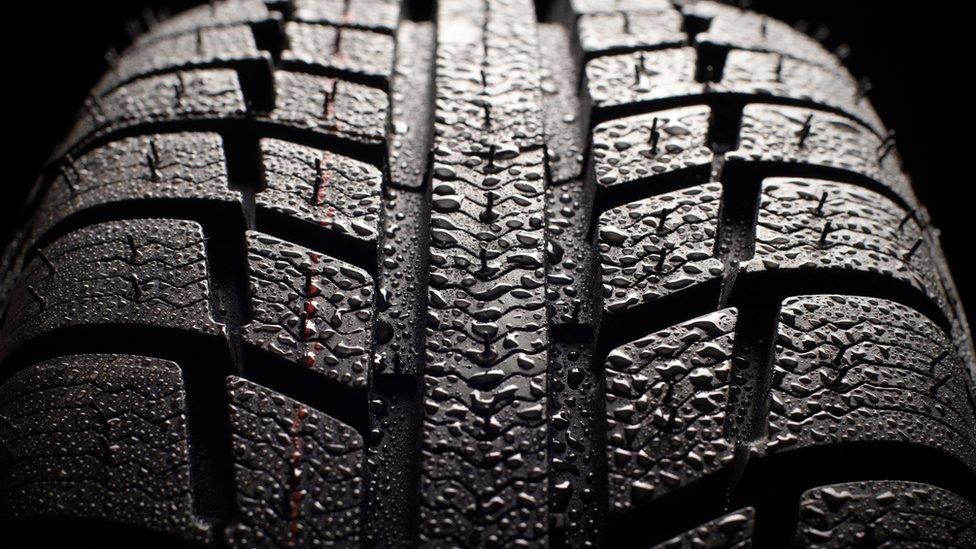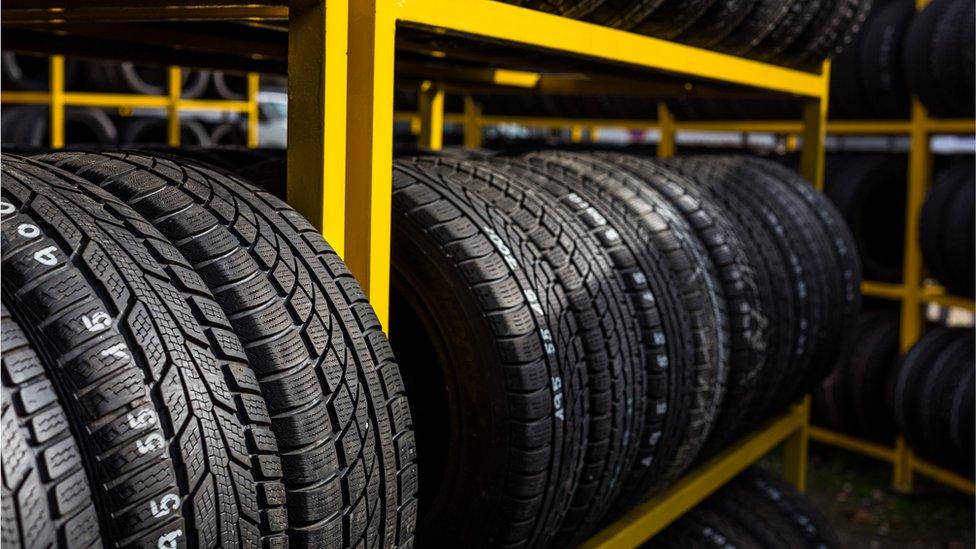Michelin in Dundee: Wheel of misfortune
- Published
Different fittings of tyres have been growing at a staggering 10% per year in the past two decades.
Car buyers like the look of big wheels. And although tyres for standard wheels are more fuel efficient, the Dundee factory has been undercut both by changes in the market and cheaper imports.
There's a lot more change to come for the car industry as it goes electric and autonomous.

If you've needed new tyres recently, you probably found that they had to be ordered and trucked from a distant warehouse.
It used to be that you could go into a garage, you might get a choice of three manufacturers, and there and then, the mechanics could haul any of the three off a storage rail.
What used to take 20 minutes now takes days, and often a lot more money.
The change is partly down to the business practice of limiting stock to reduce costs, and having car parts delivered to order.
But it has more to do with the growth in the range of tyres.
That seems to be the reason why Michelin has not only punctured hopes for continued employment at its Dundee manufacturing plant, but on Tuesday it is telling its 845 workers that it will have the whole operation up on bricks within two years.
It's not quite like the rapid demise of the horse-drawn carriage-builder early last century. The auto industry will remain huge. But it's in the early stages of very significant change, and the Dundee workforce has been very unfortunate to find that it's making the items that are going out of automotive fashion.
Car buyers increasingly want big wheels, on the basis that, well, they look cool. Big wheels require thinner tyres, if they are to fit the profile of the car.
Car buyers also like big chunky Sports Utility Vehicles, and they are designed with big chunky wheels and tyres.
And with so much more variation in the market, the growth in the range of tyres required is simply astonishing.
According to Fleet News, a trade website for those who buy their cars by the dozen, tyre choice has been rising at around 10% per year.
It says that "in 1997, 19 tyre sizes accounted for up to 90% of company car tyre fitments. Today 120 tyre sizes account for 90% of fitment, with the remaining 10% comprising a staggering 1030 sizes."
That's a lot to ask of the tyre manufacturers. On relatively small production runs, it helps explain why niche tyres can have some alarmingly niche prices.
'Profound transformation'
And what of the bog standard 16-inch wheel? Well, it's still there, on a bog standard car. But that's Dundee's problem. Car makers selling bog standard cars, in a price-sensitive segment of the market, choose to fit them with bog standard tyres, which can be manufactured more cheaply in Asia.

The range of tyres available has increased rapidly in recent years
Dundee's role within the 17-country, 105,000-worker, French-based Michelin empire has been to produce not just 16-inch tyres, but premium ones.
And while demand for them has not disappeared, it has fallen away sharply. From the HQ in Clermont Ferrand, they say it is "a profound transformation", and one that has accelerated.
According to Dundee factory boss John Reid, the change is "dramatic and permanent" and the company "has to address these structural changes".
It could have done so by re-tooling the Dundee plant for the wider range of tyres demanded.
But having already spent 70 million euros on modernising the site in recent years, Michelin doesn't want to plough in more. "The plant is unsuitable, and conversion is not financially viable," it says.
Electric flux
In a recent warning to the French stock exchange about the state of the tyre market, Michelin's finance chief was quoted by the Financial Times as saying "there is a lot of nervousness in the market today. There have been multiple evolutions of guidance [by the carmakers] in particular."
In other words, the whole industry is in a state of flux. We know why it's in a state of not just flux but high anxiety in the UK. Manufacturing supply chains face a rupturing through Brexit.
New car sales are down 7% so far this year, and 10% in Scotland. That is after some years of strong figures, fuel injected by a revolution in the way cars are financed in Britain.
The industry more widely is having to make rapid adjustments as demand for diesel cars plummets and both hybrid electric and plug-in electric cars see rapid growth.

Michelin boss Jean-Dominique Senard is heading up a company having to adjust to a changing marketplace
It's not simple to make that adjustment. Electric power requires a lot more space and weight for batteries. The spare tyre tends to be one casualty, meaning a shift towards a more expensive tyre designed to keep running while punctured, at least far enough to get to somewhere it can be replaced.
Yet that push towards lower emissions could also become a push back towards the beleaguered 16-inch wheel.
Bigger wheels not only provide a less cushioned, less comfortable ride: they also tend to use more fuel. And the wider the wheel hitting the road - "rolling resistance" in the jargon - the more noise. The decibel count could become more of an issue as internal combustion gives way to an electric whirr.
As for the autonomous car? When that rubber hits the road, it may be too much, for now at least, to expect it to change its own tyres.